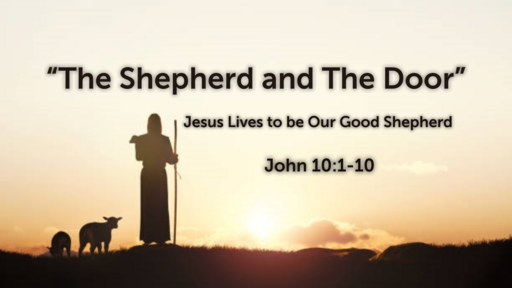Fourth Wednesday of Easter (2023)

Notes
Transcript
“You just don’t get it, do you?” “The lights are on, but nobody’s home!” “He’s not playing with a full deck.” People use such phrases to suggest that someone lacks a little something in the intelligence department.
A careful reading of our text might have us questioning our own intelligence. Jesus uses a “figure of speech” (v 6) to communicate divine truth, but as though we sinners didn’t have enough going against us—we who cannot by nature “accept the things of the Spirit of God” (1 Cor 2:14)—the Savior seems to make it extra challenging by changing the images. Is he the shepherd? Is he the door? Is he both? It gets confusing! If you put all of the images from today’s readings together, you get (are you ready?) the Lamb is the Shepherd who is the Door that marks the Shepherd who leads the sheep. Confusing? I agree. But not to worry. In these words, the Good Shepherd’s voice is calling, and his flock will hear and follow it to his abundant life!
The Lamb is the Shepherd
The Lamb is the Shepherd
But he who enters by the door is the shepherd of the sheep. To him the doorkeeper opens, and the sheep hear his voice; and he calls his own sheep by name and leads them out.
The Epistle (1 Pet 2:23) holds before us Isaiah’s picture of the sacrificial Lamb made to bear our punishment (Is 53:7).
This Lamb is “the Shepherd and Overseer of your souls” (1 Pet 2:25).
Thieves and robbers, who are not the shepherd, sneak in to the sheepfold to use the sheep to their own advantage (v 1).
The Pharisees cast out the blind man because his confession threatened their status (Jn 9:34).
False evangelists of our day gather flocks in order to fleece them.
The Lamb is a Good Shepherd.
He enters by the door. (See Jn 18:20; Lk 22:53; Mk 11:31–32, passages that contrast Jesus—who spoke openly, honestly, and without concern for himself—with his enemies, who operated under a cloak of darkness and only spoke to make themselves look good.)
He is recognized by his voice, the Gospel. The Gospel is not about what we owe God (or his messengers), but of what God in Christ freely gives us: forgiveness, life, and salvation.
He leads all his sheep safely in and out. Regardless of where we go in life or what happens to us, the Good Shepherd has gone there ahead of us and remains with us. Although the evil of this world surrounds and infects us as sinners, in his gifts Christ constantly cleanses and restores us.
The Lamb who suffered for our sins is also the Shepherd who leads and guides us, but . . .
The Shepherd is the Door
The Shepherd is the Door
I am the door. If anyone enters by Me, he will be saved, and will go in and out and find pasture.
Through him alone, the sheep are led to safe pasture. In him, even our “walk through the valley of the shadow of death” (Ps 23:4) becomes a blessing. Unjust suffering (the Epistle), although unpleasant, is made to serve our benefit.
Through him alone, the sheep are brought into the safety of the fold (Jn 10:28–29). The Church consists of all who are in Christ.
The Shepherd who leads us is also the Door to life eternal; furthermore . . .
The Door marks the Shepherd
The Door marks the Shepherd
“Most assuredly, I say to you, he who does not enter the sheepfold by the door, but climbs up some other way, the same is a thief and a robber.
Thieves and robbers (such as the Pharisees) show themselves by their unwillingness to enter by the door, to confess Christ.
Faithful pastors (shepherds) are gifts from God who sound the Good Shepherd’s voice (Acts 20:28–30; 1 Pet 5:1–4) to the whole flock and to individual lambs.
They warn the flock of dangers.
They cleanse and bind wounds with the Gospel.
Pastors are instruments of the Good Shepherd; through their faithful labors . . .
The Shepherd leads the sheep to abundant life
The Shepherd leads the sheep to abundant life
The thief does not come except to steal, and to kill, and to destroy. I have come that they may have life, and that they may have it more abundantly.
Thieves and robbers have nothing but their own interest at heart.
The Good Shepherd has nothing but selflessness at heart.
He, the Shepherd-Lamb, lay down his life for the sheep.
He has taken it up again, not for himself, but for his blood-bought sheep.
The Lamb, Who Is Also the Shepherd, Has Become the Door through Which Shepherds Safely Lead God’s Sheep to His Abundant Life
